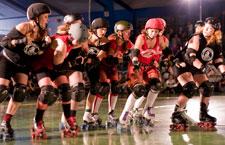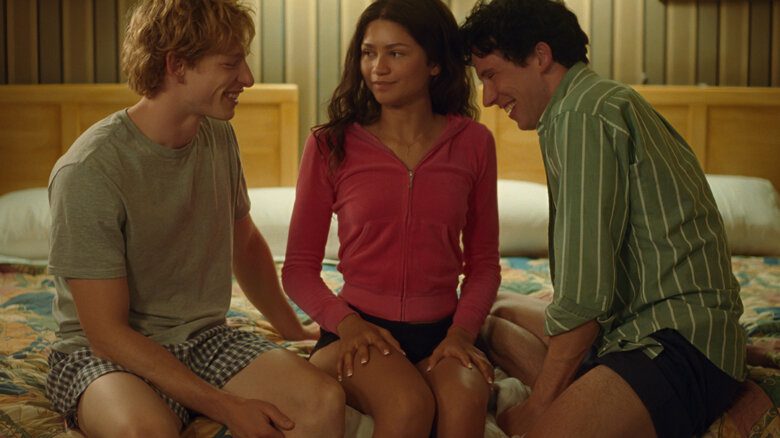Grunt laces up her fast black skates with their cherry red wheels. She’s put on her knee high socks and her sexy little shorts. She’s got her heavy-duty knee, wrist and elbow pads on, her mouth guard in place, her helmet securely fastened.
This is the kind of thing you see when you meet any member of the Terminal City Roller Girls, Vancouver’s only flat-track, all-girls roller derby league.
The league has a wild reputation for extreme skating, extreme speed and lesbian-filled rosters. Grunt estimates the lesbian crop to be upwards of a quarter of the league, and that’s not even counting the girls that prefer the looser classifications of bisexual and exploring.
It’s not hard to see the draw. The derby rink is a helter-skelter of fired-up girls in scanty clothing pounding each other relentlessly, ramming into each other, and even busting into good old-fashioned brawls. What’s not to like?
It’s a tough sport played by some of the toughest girls I’ve ever seen. Round and round the track they go plowing into each other at full speed, tumbling down, popping back up. They seem fearless as they zip and zoom and whip and crash.
It’s a simple game: two teams of five girls. The point scorer, the jammer, racks up notches on the scoreboard by whizzing around the track, lapping other players. Her teammates help speed her along. Some of them grab hold of her and whip her around the curves. Others try to clear the way by knocking opposing players off the track.
Our jammer just has to skate real fast, avoid the chaos and dodge the defence %mdash: unruly girls who want to smack her down, hit her, block her path, cause a world of difficulty. These troublemakers are the blockers. Grunt is one of them.
Grunt is Mel Bostrom’s derby name, her alter ego, the character she plays when she’s on the rink. Every girl has one.
There’s Booty Quake and Chica Bomb, Vendetta and Lorenagade.
Grunt chose her name because she’s “one of the grunt workers.”
She’s a founding member of the league, one of the engines propelling it forward, helping it grow every year. Sitting on a handful of league committees, she spends countless hours toiling for the cause.
Some days she’s out looking for new practice facilities so the girls don’t have to spend too many more winters training in outdoor spaces, like the Osborne rink on the UBC campus.
Other days she’s trying to think of ways to make the games more exciting for both skaters and spectators, spreading the word and generating hype. You can see the pride in her eyes as she talks about the crowd of over 1,000 that came out to last season’s opener.
In the last few years they’ve held games at the Minoru Arena in Richmond and they’ve had some luck at the Royal City Curling Rink in New Westminster, but they have no proper home yet, no rink or arena to call their own. They’re vagrants, organizing their practices and games at whatever facility is available and affordable, a tall order in the advent of the Olympics.
Grunt doesn’t get discouraged by these obstacles. She underscores the fact that theirs is a grassroots organization and even cites this as the reason the league is such an empowering place for all of its women, particularly its lesbian contingent.
League business has also led to unexpected flourishes in Grunt’s love life. She’s travelled all around North America for derby conventions and matches and says she’s met some great women. During one of her intercity tours, Grunt struck up a love affair with another roller girl. “We had an on again/off again something that wasn’t quite a relationship,” she says.
Although this particular tryst didn’t end in a happily-ever-after, Grunt is satisfied with the result. “It made me grow as a person and helped me see what I wanted in a relationship.”
Grunt found what she wanted during an all-derby weekend in Calgary last summer. During a weekend of intense roller derby action, she met her someone special and has since been enjoying this newfound love. “I found someone that I can share my life with,” she says plainly. “If it wasn’t for derby, I’d still be single.”
When I look at Grunt off the track, I have trouble seeing the brash and ballsy roller girl.
Standing at an average height, of an average build, her brown hair is pulled back into an ordinary ponytail. She’s reserved, fading into her baggy jeans and heavy sweatshirt; a quiet woman with a small voice, a flat speech.
“I’m really not the kind of person who wears skirts and short shorts. But for derby I would,” she says.
This seems to be a theme in the league. Derby girls have almost disappointingly normal day lives, making scant trips into the risqué. They’re architects, dental hygienists and students, outfitted in plain, forgettable garb. Grunt herself works in the warehouse of a bicycle parts manufacturer.
In the world outside of roller derby she’s just Mel.
Mel spends part of the workday in front of a computer, the other part lifting and lugging 20-pound boxes. But when the skates come on, the short shorts come out, and a pack of firecrackers emerge on the track.
Grunt’s family, like most derby families, worry about her when she’s out on the rink. The sport has a high record of injuries. The league guarantees would-be members at least some kind of pain. You may get away with just a busted lip or some legendary bruises, but broken bones and concussions aren’t strangers to the sport.
Grunt tells me about a bout last year during which a big girl struck her a heavy blow. “I’m usually rolling and back on the track after a hit, but I had this moment where I wasn’t sure,” she confides. “I had to take a few seconds before I could get back up.”
A scary moment for her and a terrifying moment for her family watching from the stands. The whole family thinks she’s insane, but Grunt shrugs off their worries. “It’s not a violent sport,” she assures me. “It’s just a sport that has hitting.”
But there’s a softer side to derby life.
There’s a support system among the girls, a camaraderie, a closeness knit from a true love for the sport and a communal desire to make every game, every practice as great as it can be.
The league is still a small one, made up of just three teams: The Riot Girls, The Faster Pussycats and The Bad Reputations. There’s some rivalry between teams, some sporting jeers, some healthy ribbing and a whole lot of bravado, but it’s a good-natured sort of competition that permeates. The girls all profess allegiance to the league first, team second.
I watch the girls on the rink as they form the “circle of pain” %mdash: a torturous conditioning workout where each girl in the circle comes up with a straining and draining exercise to do.
It’s not just these intensive training sessions that cement the girls’ bonds. They spend hours together each week, skating and working out and volunteering for league duties. Plus there’s a party after every game, regular phone calls and events and outings.
There’s also a concerted effort to engrain the league in the community. Last year, the girls marched in the Vancouver Pride Parade.
“An awesome experience,” Grunt recalls, “just to see the amount of people who came out to support the gay community.”
But Grunt’s connection to her Vancouver roller family is now long-distance. She moved to Calgary a few months ago to be with her girlfriend.
Her biological family supported her when she told them of her imminent move. The tough part was breaking the news to her derby family.
She’d been a member of The Riot Girls since the team’s inception and her teammates didn’t want to see her go.
The derby has “pretty much been my life for the last three years,” she says, not sure whether she’ll plunge into the Calgary league or take some time to herself for awhile.
For now at least it looks like the black skates with the cherry red wheels will be resting in Grunt’s old, very smelly gym bag. But she’s optimistic about their future; she knows she won’t leave them idle forever.
“I’ll always be a Terminal City Roller Girl,” she says.

 Why you can trust Xtra
Why you can trust Xtra


